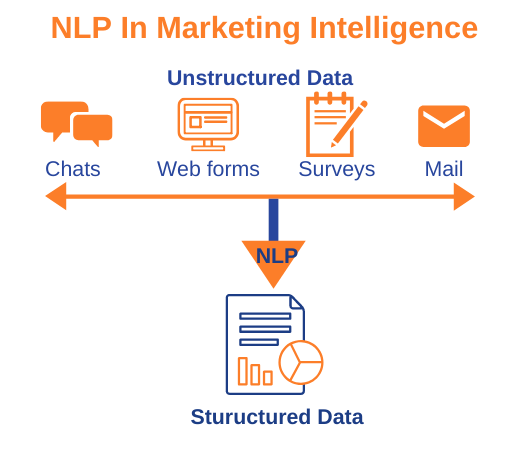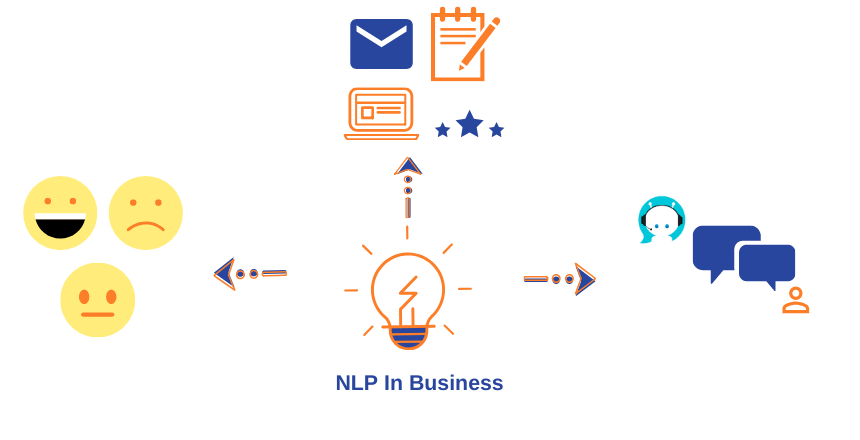Peter Drucker says “..the purpose of a business is to create a customer..“. This sage like wisdom implies the need for businesses to focus their efforts on understanding the needs/ pains of potential customers and thereafter, addressing the needs formally through products and services that could be developed based on the businesses ability to innovate and launch new products.
In other words, there seems to be a definitive need for every business to understand the potential or existing customers needs, interests, and behavior. To get this data, the business needs to collect data from customers through various means of primary and secondary research. The data thus collected could be in an unstructured format like documents and voice or in semi-structured format like images or videos etc.. The volume of data collected should be parsed and analyzed to draw meaningful conclusions, which when handled manually is a very time-consuming process for the business.
With the help of AI, businesses can automate the process of drawing conclusions and making predictions by analyzing the unstructured/ semi-structured data. The specific AI technology that is related to language is called Natural Language Processing. And, this article is about the importance of Natural Language Processing for businesses, where language that we speak and write to communicate is used to understand the needs of customers.
NLP is a combination of various technologies – Artificial Intelligence (AI), Semantic Search, Machine Learning (ML), and Linguistics to make the machines to interact with the humans in natural language that can be spoken and written by humans.
 For example, the end application of using NLP is the Apple iOS voice assistant, Siri or Microsoft Windows voice assistant, Cortana. When a user asks a query through voice, Siri or Cortana understands the query, processes it, and responds to the query in a natural language.
For example, the end application of using NLP is the Apple iOS voice assistant, Siri or Microsoft Windows voice assistant, Cortana. When a user asks a query through voice, Siri or Cortana understands the query, processes it, and responds to the query in a natural language.
Typically, progressive businesses have abundant data, but it can’t be harnessed fully and put to effective use because it is in unstructured/ semi-structured formats, which is a raw format that cannot be optimized by a keyword based search engine. To optimize such unstructured data, natural language processing is required to draw meaningful conclusions.
NLP can help businesses in providing sentiment analysis, simplified access to data, and customer-focused solutions using chatbots or virtual assistants.
NLP can help a business in analyzing customer sentiments
 Sentiment analysis is a measurement of opinions of customers on the particular brand’s product/ services. The sentiment analysis is also called opinion mining. There are many forms of sentiment analysis. The sentiment analysis mostly measures positive, negative and neutral sentiments by detecting human feelings like anger, joy, sadness or intentions like interested or not interested.
Sentiment analysis is a measurement of opinions of customers on the particular brand’s product/ services. The sentiment analysis is also called opinion mining. There are many forms of sentiment analysis. The sentiment analysis mostly measures positive, negative and neutral sentiments by detecting human feelings like anger, joy, sadness or intentions like interested or not interested.
For businesses, sentiment analysis helps to know their customers opinions on their products/ services. Nowadays almost all organizations are having a social media presence. Through social media channels like Facebook, Twitter, Instagram, etc.. the organizations are deluged with unstructured data in the form of tweets, comments, posts, and feedbacks etc.. NLP technology can analyze this unstructured information and do sentiment analysis. The output of this analysis could help the businesses in evaluating the performance of their respective products/ services. Accordingly, the business can add new features to existing products/ services or innovate new products etc..
NLP can help business in collecting marketing intelligence
 Marketing intelligence is the process of collecting data from various sources like competitors, customer surveys, marketplaces, touchpoints, and customer retention.
Marketing intelligence is the process of collecting data from various sources like competitors, customer surveys, marketplaces, touchpoints, and customer retention.
Data from Competitors: Collecting data on competitors, how competitors are performing in the market, why some customers are choosing competitor products instead of their products, and what are the pros and cons of competitors. Gathering this information helps the business to make a better marketing strategy.
Product/ Services market performance: The data is about how the brand’s products/ services performing in the market by conducting customer surveys, speaking to customers, and conducting polls.
Understanding the right media: The data is related to know which channel is getting more attracted by customers like social media channels, magazines, TV, online, video, etc. The data is helpful to know where the conversions are happening more at which touchpoint. With this information, businesses can more concentrate on those touchpoints instead of wasting time on other channels.
Customer Retention Data: Customer retention is the process of reducing customer defections. For maintaining better customer retention, it is very important to understand: a) who are your buyers and whether they are satisfied with the provided services or not? and b) what are the challenges the buyers are facing and weather the challenges, the organization team can address it or not?
The data gathered from the above marketing intelligence methods is an unstructured form and can be analyzed using NLP technology to provide better insights for the businesses and thereby, take accurate decisions.
NLP can help business in providing better customer-focused solutions
Traditionally, customers call customer support team for any problem with any of the products/ services of the business. With the limited # of resources that could be deployed in customer support teams, the time to service a customer increases. This waiting time or time to be service a customer can be reduced and 24×7 support can be provided by virtual assistants built using NLP technology.
Finally, I’d like to clearly emphasize the importance of Natural Language Processing for businesses, especially for those focused on providing best customer service and delight, because the NLP technology can do better sentiment analysis, analyze unstructured data, provide meaningful insights, and facilitate better customer-focused solutions.

